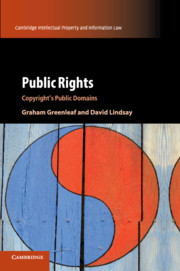Book contents
- Public Rights: Copyright’s Public Domains
- Cambridge Intellectual Property and Information Law
- Public rights
- Copyright page
- Contents
- Foreword
- Preface
- Acknowledgements
- Table of Cases
- Table of Legislation
- Table of International Instruments
- Part I What is the Copyright Public Domain?
- Part II Constraints and Supports, Global and National
- Part III Public Domains: Categories of Public Rights
- Part IV Conclusions
- 17 Reform Agendas for the Copyright Public Domain
- Bibliography
- Index
- Cambridge Intellectual Property and Information Law
17 - Reform Agendas for the Copyright Public Domain
from Part IV - Conclusions
Published online by Cambridge University Press: 07 June 2018
- Public Rights: Copyright’s Public Domains
- Cambridge Intellectual Property and Information Law
- Public rights
- Copyright page
- Contents
- Foreword
- Preface
- Acknowledgements
- Table of Cases
- Table of Legislation
- Table of International Instruments
- Part I What is the Copyright Public Domain?
- Part II Constraints and Supports, Global and National
- Part III Public Domains: Categories of Public Rights
- Part IV Conclusions
- 17 Reform Agendas for the Copyright Public Domain
- Bibliography
- Index
- Cambridge Intellectual Property and Information Law
Summary
- Type
- Chapter
- Information
- Public RightsCopyright's Public Domains, pp. 543Publisher: Cambridge University PressPrint publication year: 2018



